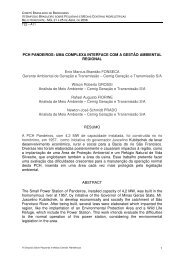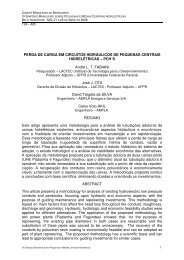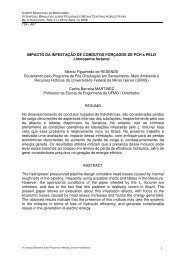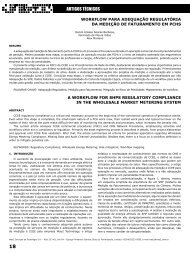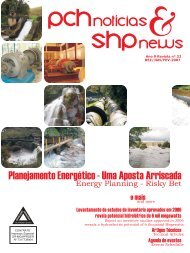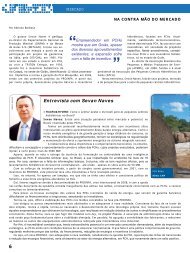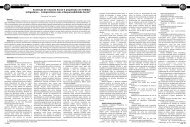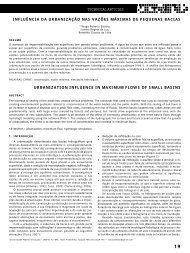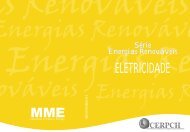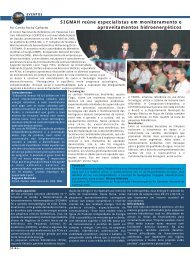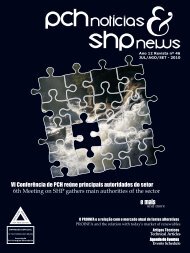Qual a perspectiva das PCH para futuro? - CERPCH - Unifei
Qual a perspectiva das PCH para futuro? - CERPCH - Unifei
Qual a perspectiva das PCH para futuro? - CERPCH - Unifei
You also want an ePaper? Increase the reach of your titles
YUMPU automatically turns print PDFs into web optimized ePapers that Google loves.
The reduced energy offer and the future expectations of high<br />
prices signal the need for investments in generation and a risk of rationing<br />
that is getting closer to the reality day by day.<br />
Within today's energy scenario, the SHPs are feasible investment<br />
alternatives, given that they present low environmental impacts<br />
and a high funding capacity, and also due to the several incentives<br />
towards this type of source.<br />
Nowadays, consumers with a demand higher than 500 kW and<br />
lower than 3.000 kW, connected at any voltage level, have the possibility<br />
of purchasing the power exclusively from enterprises classified<br />
as alternative sources enterprises, and among them the small<br />
hydropower plants stand in a superior position.<br />
The exclusivity of this market, together with the discount in the<br />
distribution and transmission tariffs, according to Laws 9648<br />
(May/27/1998) and 10438 (April/26/2002), and the need for<br />
energy offer within this segment of the market, only strengthens<br />
the idea that the investment in SHPs is an excellent alternative for<br />
the next few years.<br />
This way, it is believed that there will be a growing energy offer<br />
coming from SHPs as a result of the assimilation of these favorable<br />
conditions by the investors.<br />
According to data released by ANEEL (National Agency for Electric Power) the power<br />
market has been growing about 4.5% every year and it must transcend 100 GW in 2008.<br />
For the expansion of the Brazilian power matrix, the medium-term government planning forecast<br />
the need for investments ranging between R$ 6 and 7 billion/year in order to meet<br />
the demand of the consuming market. This way, it is clear that the creation of new power<br />
generating enterprises is a good opportunity for business.<br />
At the same time, the rectification of the Kyoto Protocol allowed its instruments, the Clean<br />
Development Mechanism (CDM), for example, to become a reality. The reduction in the<br />
emission of greenhouse gases became a trend, and it is an important tool regarding the feasibility<br />
of renewable energy enterprises. Today, the CDM is an international financial mechanism<br />
that deals with billions of dollars and spurt additional investments in clean energy,<br />
particularly hydroelectricity. The present status of the new carbon market presents excellent<br />
funding opportunities for new CDM projects for power companies.<br />
SHP projects in the range of CDM are already fully developed. They have applicable methodologies,<br />
which makes the structuring process of the project much faster and safer. Today,<br />
there are 18 projects in Brazil registered under the CDM, i.e., already approved by<br />
UN's Executive Council. There are also 15 projects undergoing the registering process and<br />
19 that must be validated. Altogether, there are 52 projects of Small Hydropower Plants<br />
that are aiming at attaining carbon credits in the Brazilian scenario. This is an expressive<br />
number if compared to other CDM technologies. Thus, once it is known that the country<br />
has 269 operating SHPs, 41 that are being constructed, and 215 that have already been<br />
granted, but still are not operating, one can notice that there are plenty of opportunities in<br />
the sector. In addition, the CDM may also be an important tool to help the refurbishment<br />
and operation of inactive plants or the repowering of small plants.<br />
With incentives such as PROINFA (a program that encourages power production out of<br />
alternative sources of energy), which is being revised based on the results that were achieved<br />
during the first phase of the program, the carbon credit market and the subrogation of<br />
the CCC (Fuel Consumption Account), the latter used for projects implemented in the isolated<br />
system of the North region, enterprises such as Small Hydropower Plants are great<br />
long-term investments.<br />
EcoSecurities<br />
The Anglo-Brazilian multinational company, EcoSecurities, is the largest and the most<br />
experienced company in the world regarding the development of CDM projects. Having offices<br />
in 20 countries in the five continents, EcoSecurities has accumulated the widest and<br />
the most diversified portfolio of carbon projects in the market. Today, the company has a<br />
portfolio that comprehend more than 280 projects in 27 countries, with a potential to generate<br />
approximately 150 million of carbon credits.In the vanguard of the carbon market, Eco-<br />
EVENTS<br />
Grupo Rede<br />
Acting in energy distribution, generation and commercialization<br />
for over a century, Grupo REDE is today one of the largest business<br />
groups of the National Electric Sector. Through its distribution<br />
utilities, Grupo Rede supplies energy to 502 cities located in the states<br />
of São Paulo, Minas Gerais, Paraná, Tocantins, Mato Grosso and<br />
Pará – over 3 million consumers. As far as generation is concerned,<br />
the main enterprises are Lageado Hydroelectric Plant (902.5 MW)<br />
in the state of Tocantins and Guaporé Hydroelectric Plant (120 MW)<br />
in the state of Mato Grosso. In the commercialization area, the<br />
group carries out activities related to the purchase and sale of electric<br />
power, trades with free customers, development of products<br />
and services for companies, among others.<br />
Grupo REDE connects thousands of Brazilian citizens to<br />
the productive market, taking not only electricity, but also the sense<br />
of citizenship to the regions where it acts. In addition, Grupo<br />
REDE believes in the importance of the relationship between company<br />
and consumer, always impelling the socio-economic development<br />
in Brazil.<br />
Securities has acted in the development of<br />
the main aspects of the world carbon market,<br />
including the development of the first<br />
CDM project of the world registered under<br />
the Kyoto Protocol.<br />
In relation to hydroelectricity, EcoSecurities<br />
has already developed CDM projects<br />
in several countries. The first CDM project<br />
with carbon credits was the project of La<br />
Esperanza hydroelectric plant in Honduras,<br />
which was developed by EcoSecurities.<br />
The business model of the company, based<br />
on the guaranteed purchase of the carbon<br />
credits generated by the project, assures<br />
the project developer a revenue flow<br />
without market risks. In addition, as the<br />
company has a specialized monitoring team,<br />
EcoSecurities can assure the good performance<br />
of its projects, maximizing the generation<br />
of carbon credits.<br />
As a result, EcoSecurities was recognized<br />
as the best consultancy company regarding<br />
the area of CDM by the magazine<br />
Environmental Finance for the past five years.<br />
Veja to<strong>das</strong> as apresentações acessando:<br />
www.cerpch.unifei.edu.br<br />
47



